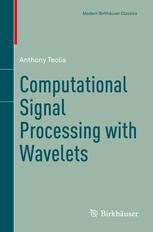

Most ebook files are in PDF format, so you can easily read them using various software such as Foxit Reader or directly on the Google Chrome browser.
Some ebook files are released by publishers in other formats such as .awz, .mobi, .epub, .fb2, etc. You may need to install specific software to read these formats on mobile/PC, such as Calibre.
Please read the tutorial at this link: https://ebookbell.com/faq
We offer FREE conversion to the popular formats you request; however, this may take some time. Therefore, right after payment, please email us, and we will try to provide the service as quickly as possible.
For some exceptional file formats or broken links (if any), please refrain from opening any disputes. Instead, email us first, and we will try to assist within a maximum of 6 hours.
EbookBell Team

4.3
8 reviewsThis unique resource examines the conceptual, computational, and practical aspects of applied signal processing using wavelets. With this book, readers will understand and be able to use the power and utility of new wavelet methods in science and engineering problems and analysis.
The text is written in a clear, accessible style avoiding unnecessary abstractions and details. From a computational perspective, wavelet signal processing algorithms are presented and applied to signal compression, noise suppression, and signal identification. Numerical illustrations of these computational techniques are further provided with interactive software (MATLAB code) that is available on the World Wide Web.
Topics and Features
This book is an excellent resource for information and computational tools needed to use wavelets in many types of signal processing problems. Graduates, professionals, and practitioners in engineering, computer science, geophysics, and applied mathematics will benefit from using the book and software tools. The present, softcover reprint is designed to make this classic textbook available to a wider audience.
A self-contained text that is theoretically rigorous while maintaining contact with interesting applications. A particularly noteworthy topic…is a class of ‘overcomplete wavelets’. These functions are not orthonormal and they lead to many useful results.
—Journal of Mathematical Psychology